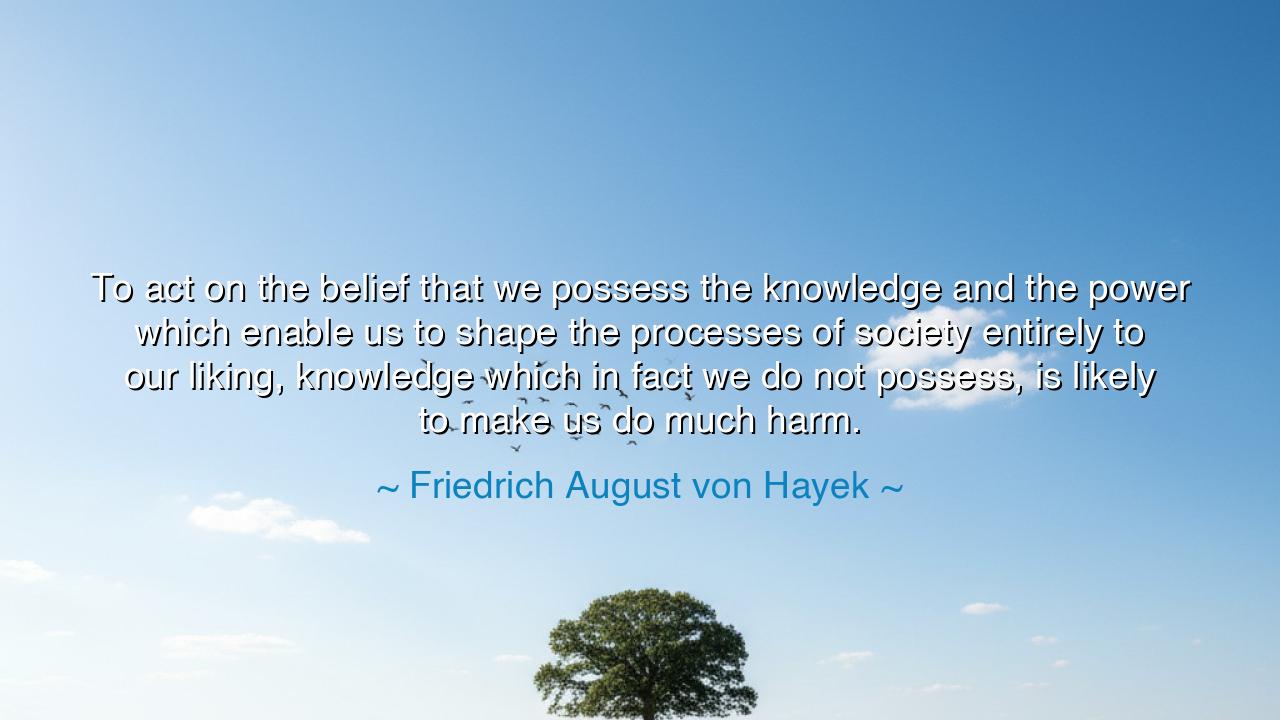
To act on the belief that we possess the knowledge and the power
To act on the belief that we possess the knowledge and the power which enable us to shape the processes of society entirely to our liking, knowledge which in fact we do not possess, is likely to make us do much harm.






In the profound words of Friedrich August von Hayek, the great economist and philosopher of liberty, we find a warning that echoes through the corridors of history: “To act on the belief that we possess the knowledge and the power which enable us to shape the processes of society entirely to our liking, knowledge which in fact we do not possess, is likely to make us do much harm.” These are not the words of caution alone, but of deep humility — the humility that comes from understanding the limits of the human mind. For Hayek, the greatest danger lies not in ignorance itself, but in the illusion of knowledge, that subtle arrogance that makes man believe he can control what is beyond his comprehension.
This quote arises from the wisdom Hayek gained in the crucible of the twentieth century, an age when vast empires and ideologies tried to engineer society as though it were a machine. He watched as great nations — driven by visions of perfection — sought to bend humanity to their own designs. Communism promised equality through control; fascism promised order through force. Both claimed to hold the knowledge of how society should be shaped. Yet both brought devastation. From the ashes of these experiments, Hayek spoke with the voice of a prophet: beware the arrogance of planners who claim to know the destiny of mankind, for their certainty will lead not to peace, but to ruin.
At its heart, Hayek’s teaching is a hymn to the mystery of human complexity. Society is not a structure to be built by a single architect, but a living organism, growing, learning, and adapting through countless unseen interactions. No one mind can grasp it, no one plan can contain it. When men believe they can shape it entirely — that they can rewrite the laws of nature and human behavior — they commit the oldest sin of all: hubris, the pride that blinds the wise and destroys the mighty. The ancients told of Icarus, who, believing himself master of the skies, flew too close to the sun. So too do the social engineers of every age melt their wings in the heat of their own presumption.
Consider the tale of the Soviet Union, born from the dream of creating a perfect society through human design. Its leaders believed that with the right plan — with power centralized and knowledge concentrated in the hands of a few — they could command prosperity, equality, and happiness. Yet what followed was famine, oppression, and fear. The planners had forgotten what Hayek knew: that no man, nor group of men, can know enough to direct the destiny of millions. The wisdom of the world does not flow from the top down, but from the countless choices and relationships of free individuals. The attempt to control it destroys the very life it seeks to perfect.
Hayek’s words also reach beyond politics into the soul of each person. For in every human heart there lies a temptation to control — to impose one’s will upon others, to shape family, friends, or the world to one’s liking. Yet wisdom teaches that harmony cannot be commanded; it must be cultivated. Just as a gardener cannot force a flower to bloom by decree, neither can a leader, a parent, or a nation force the unfolding of life’s natural order. To act without humility is to sow destruction in the soil of pride. The wise man learns instead to guide gently, to nurture freedom, and to trust the organic order of things.
Therefore, let the listener understand: the greatest knowledge begins with the recognition of what we do not know. The greatest power lies in restraint, in the choice not to force the world into our image. True leadership, true wisdom, is not in mastering all, but in creating space for others to grow, to choose, to live freely. The proud builder of systems falls; the humble steward of liberty endures.
So take this teaching into your heart: when you look upon the world, do not seek to command it, but to understand it. When you build, build with reverence for the unknown. When you lead, lead not by control, but by trust. Remember Hayek’s eternal truth — that man’s knowledge is but a flicker against the vastness of creation, and that to act as if we know all is to invite disaster. The wise, therefore, do not seek to rule the world; they seek to serve it. They walk with humility, knowing that freedom, not force, is the seedbed of peace, and that the unseen hand of life, if left to move freely, will weave a pattern far more beautiful than any we could design.






AAdministratorAdministrator
Welcome, honored guests. Please leave a comment, we will respond soon